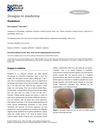 February 2013 in “Journal of the American Academy of Dermatology”
February 2013 in “Journal of the American Academy of Dermatology” Iron supplements may reverse premature hair graying caused by iron deficiency.
 October 2022 in “Egyptian Journal of Health Care”
October 2022 in “Egyptian Journal of Health Care” Female nursing students with iron deficiency anemia have poor knowledge and practices regarding iron intake, needing better health education and physical monitoring.
 February 2024 in “Journal of ayurveda and integrated medical sciences”
February 2024 in “Journal of ayurveda and integrated medical sciences” Ayurvedic medicine helped increase a young woman's hemoglobin levels and improved her anemia symptoms.
 July 2018 in “International journal of clinical & experimental dermatology”
July 2018 in “International journal of clinical & experimental dermatology” Eat a balanced diet for healthy hair; only use supplements if you have a proven nutrient deficiency.
 May 2024 in “Journal of trace elements in medicine and biology”
May 2024 in “Journal of trace elements in medicine and biology” Overweight or obese women before pregnancy have lower iron levels in their serum and hair during early pregnancy.
 March 2024 in “Indian Journal of Dermatology”
March 2024 in “Indian Journal of Dermatology” Iron supplements may improve hair loss satisfaction even if initial iron levels are normal.
 10 citations,
July 2018 in “Our Dermatology Online”
10 citations,
July 2018 in “Our Dermatology Online” Some vitamins and minerals are important for preventing hair loss, but treating hair loss with them without a known deficiency is not proven effective.
 January 2016 in “Elsevier eBooks”
January 2016 in “Elsevier eBooks” Finasteride helps hair growth.

Iron supplements may reverse premature graying in iron-deficient individuals; ingrown nails are common in diabetics with certain risk factors; topical finasteride may reduce scalp DHT as effectively as oral finasteride; monilethrix treatment is challenging but some medications can help.
 January 2018 in “International journal of food and nutrition research”
January 2018 in “International journal of food and nutrition research” Intermittent iron and nutritional supplements can help reduce hair loss.
 21 citations,
January 2014 in “Dermatology Research and Practice”
21 citations,
January 2014 in “Dermatology Research and Practice” Hair and serum levels of zinc, copper, and iron are similar in people with alopecia areata and healthy individuals.
 November 2021 in “International Journal of Research in Dermatology”
November 2021 in “International Journal of Research in Dermatology” Low iron levels are linked to certain types of hair loss.
 134 citations,
December 2018 in “Dermatology and Therapy”
134 citations,
December 2018 in “Dermatology and Therapy” Some vitamins and minerals like vitamin D and iron can help with certain types of hair loss, but more research is needed for others.
 7 citations,
January 2017 in “Journal of Clinical Biochemistry and Nutrition”
7 citations,
January 2017 in “Journal of Clinical Biochemistry and Nutrition” Higher vitamin D levels are linked to higher iron levels in Korean women without metabolic syndrome, but not in those with it.
 28 citations,
October 2007 in “PubMed”
28 citations,
October 2007 in “PubMed” Low iron levels are linked to more hair loss in non-menopausal women.
 63 citations,
May 2017 in “American Journal of Clinical Dermatology”
63 citations,
May 2017 in “American Journal of Clinical Dermatology” People with alopecia areata often have lower levels of vitamin D, zinc, and folate, but more research is needed to understand if supplements can help treat it.
146 citations,
September 2013 in “Advances in nutrition” Bariatric surgery can cause serious mineral deficiencies, requiring better patient education and monitoring.
 March 2024 in “International journal of molecular sciences”
March 2024 in “International journal of molecular sciences” Zinc, copper, and iron are important for skin health and may help diagnose skin diseases.
 June 2024 in “Archives of dermatological research”
June 2024 in “Archives of dermatological research” Dietary supplements might help prevent post-COVID hair loss, but serum ferritin is not a reliable indicator.
 70 citations,
January 2015 in “Journal of Clinical and Diagnostic Research”
70 citations,
January 2015 in “Journal of Clinical and Diagnostic Research” Hair loss from Telogen Effluvium usually gets better within 6 months after addressing the cause.
 January 2022 in “Indian journal of dermatopathology and diagnostic dermatology”
January 2022 in “Indian journal of dermatopathology and diagnostic dermatology” Women with diffuse hair loss often have lower iron and vitamin D levels, but their thyroid function is typically normal.
 1 citations,
May 2017 in “InTech eBooks”
1 citations,
May 2017 in “InTech eBooks” Telogen Effluvium is a common hair loss condition that can be short-term or long-lasting and is often caused by stress, illness, or nutritional issues.
 December 2020 in “International Journal of Research in Dermatology”
December 2020 in “International Journal of Research in Dermatology” Many dermatologists in India find serum peptide formulations effective for treating hair loss.
 April 2012 in “Informa Healthcare eBooks”
April 2012 in “Informa Healthcare eBooks” Telogen effluvium is a common hair loss condition where many hairs enter the resting phase, often not noticeable until significant loss occurs, and treatment focuses on the underlying cause.
 138 citations,
November 2015 in “Journal of Pharmacology and Experimental Therapeutics”
138 citations,
November 2015 in “Journal of Pharmacology and Experimental Therapeutics” Protoporphyrin IX is useful in cancer treatment but can cause health problems if not properly regulated.
 83 citations,
November 2002 in “British Journal of Dermatology”
83 citations,
November 2002 in “British Journal of Dermatology” Low iron levels are not directly linked to chronic hair loss and iron supplements may not help.
13 citations,
February 2020 in “CHEST Journal” Vitamin C supplementation can resolve pulmonary arterial hypertension caused by vitamin C deficiency.
16 citations,
January 2017 in “DOAJ (DOAJ: Directory of Open Access Journals)” Low levels of vitamin B12 and ferritin are linked to early hair graying.
 January 2013 in “The Pan African medical journal”
January 2013 in “The Pan African medical journal” Monilethrix causes short, fragile hair with no specific treatment available.
 12 citations,
July 2020 in “International Journal of Pharmaceutics”
12 citations,
July 2020 in “International Journal of Pharmaceutics” Iron oxide nanoparticles improve skin penetration and drug release for hair loss treatment.



























